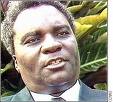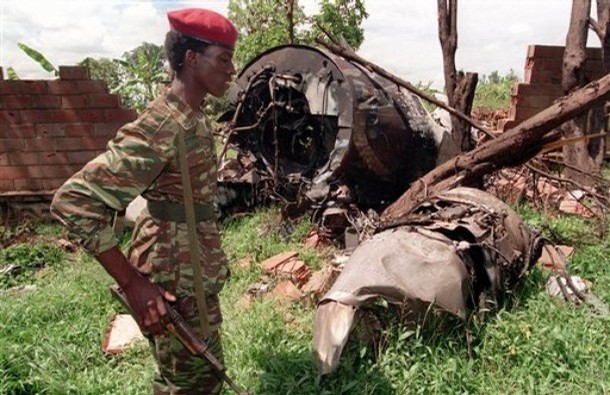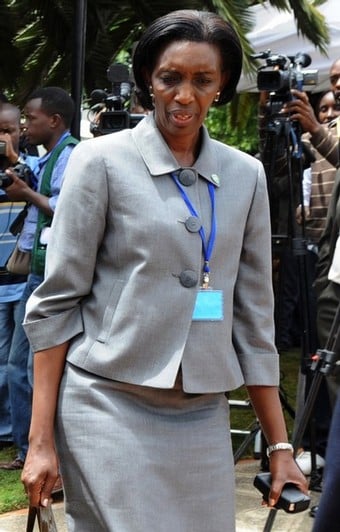“Rwanda’s Deadliest Secret: Who Shot Down President Habyarimana’s Plane?”
The most under-investigated of political assassinations


Remains of Juvénal Habyarimana’s presidential plane, 1994
Retired Colonel Rose Kabuye was recently arrested in Germany, and extradited to France, where she was charged with for complicity in murder in relation to a terrorist enterprise, for her alleged participation in the 1994 shooting down of Juvénal Habyarimana’s presidential plane, and released on bail. She is the first member of Rwandan President Paul Kagame’s inner circle to be charged in connection to what is arguably history’s least-investigated political assassination and terrorist attack.

Rose Kabuye
Who is Rose Kabuye?
Colonel Rose Kabuye was born in Uganda, the child of Rwandan expatriates, many of which left the country after it obtained independence, and following a UN-sponsored referendum abolishing the (Tutsi) monarchy in Rwanda. She attended primary school with many of the current regime’s hard-liners, and like numerous other Rwandan Tutsi exiles living in Uganda, Kabuye joined the Ugandan Army, where she held the rank of Lieutenant, and became the personal attaché of the Chief of Staff. During the same period, Paul Kagame, who attended the U.S. Army Command and Staff College (CGSC) in Ft. Leavenworth, Kansas, was Chief of Military Intelligence in the Ugandan Army.

President Paul Kagame
On October 1st, 1990, an armed group called the Rwandan Patriotic Front, composed of many Ugandan officers, including Rose Kabuye and Paul Kagame, invaded Rwanda from Uganda, with Ugandan military materiel, and Ugandan soldiers. President Museveni of Uganda claimed that these “rebels” were acting unbeknownst to him, and had “deserted” the Ugandan army; however, there is no account that any of these officers, including Kabuye and Kagame, were ever stripped of their Ugandan military rank, or that they were they ever court-martialed and charged with desertion.
It is said that Rose Kabuye—who charmed foreign journalists by holding her baby on her knee in press conferences held after the RPF invasion of Rwanda– was imprisoned for several months by Kagame in 1993, for undisclosed reasons.
In April 1994, she was back in Kigali, Rwanda, working in an administrative capacity at the RPF headquarters. French judge Jean-Louis Bruguière accuses her of having abetted the SAM 16 missile attack on the plane carrying Presidents Juvenal Habyarimana of Rwanda, and Cyprien Ntaryamira, of Burundi. The indictment states that it was in her office that the members of the “Network Commando”, the RPF cell alleged to have shot down the presidential plane, waited for their orders, on April 6th, 1994.
Rose Kabuye was named “Prefet” (or governor) of Kigali after the tragic event of 1994.
She was later designated to participate in the National Transitional Assembly by Kagame, but was later removed. Colonel Kabuye was subsequently named Chief of Protocol of President Kagame. She is the highest-ranking woman in the Rwandan Patriotic Army.
A Convenient Arrest
Kabuye’s arrest and extradition to France arrest comes at a curious time and is accompanied by circumstances that deserve closer scrutiny.
It appears that, according to both French and German government sources, Rose Kabuye had been warned that if she traveled to Germany, she would be arrested pursuant to a warrant launched by French anti-terrorism judge, Jean-Louis Bruguière; a claim she now denies, expressing instead “surprise” at her arrest. Much has been said of Colonel Kabuye’s willingness to face justice in France so that “the truth be known”; President Paul Kagame has ever referred to “lancing the boil”.
It has been speculated that General Kagame has sent his Chief of Protocol—a Lieutenant herself—to attempt, first, to obtain a copy of judge Bruguière’s file, and secondly, to “reveal the weakness” of the case against himself, and inner circle. Indeed, Kabuye is, among those charged, the individual against whom the charges are least severe, and whose implication may seem to be less instrumental than others. This theory is revealing to some extent, but fails to take into account what are high-level diplomatic and political attempts to paradoxically, move away from, and not towards, the truth.
The shooting down of the plane carrying Presidents Habyarimana of Rwanda and Ntaryamira of Burundi triggered the large-scale massacres that followed. The role of this attack on the nightmare that unfolded is obvious, yet over the years, and with the exception of judge Bruguière’s investigation, efforts to elucidate this crime have been frustrated almost every step of the way. An investigation was requested on numerous occasions, by numerous parties; significantly, by the Security Council, almost immediately, whose reminders to the Secretary-General to investigate the circumstances of the attack were not followed; by the Rwandan Government, after the plane was shot down; by the African Union; and following the UN resolution establishing the International Criminal Tribunal for Rwanda, the Subcommission on Prevention of Discrimination and Protection of Minorities adopted resolution 1994/1 entitled “Situation in Rwanda”, calling the attention of the Commission of Experts, established by the Security Council, to the need to inquire into the circumstances of the shooting down of the plane.
In 1997, as defense counsel for Georges Rutaganda before the ICTR, I argued a motion requesting the Prosecutor disclose results of investigations into the shooting down of the Presidential plane, or be directed to undertake investigations, if none had been carried out. The Prosecutor’s representative responded:
“Our responsibility and mandate is not to investigate plane crashes. That’s not really our function. Therefore, I would categorically answer this question by saying that, first, we don’t have any such investigation. We have not made any such investigation and we don’t have any reports. And, secondly, it is not our function, it is not our mandate, to investigate plane crashes or presidents, vice-presidents, or whoever it is. And, therefore, this is really a matter not within our province.”
We have since learned from Michael Hourigan, Australian lawyer and one of former Prosecutor Louise Arbour’s lead investigators, that investigations had in fact been carried out (and at the material period when this fact had been denied), but had been shut down by Prosecutor Arbour personally once Hourigan informed her that he had credible evidence that a “network commando” of the RPF had shot down the plane.
The efforts to undermine this investigation over the years are significant, and the testimony of Abdul Ruzibiza, a former RPF officer who testified before the ICTR, sheds substantial light on why that may be. Ruzibiza, one of judge Bruguière’s witnesses, claims to have recanted the totality of his testimony in several telephone interviews given last week. Yet Ruzibiza wrote a book setting out in detail the fact that Kagame’s RPF shot down the plane with the knowledge that armed hostilities would resume in Rwanda, as he was dissatisfied with the political process undertaken after belligerent parties had signed the Arusha Peace Accords. In other words, knowing full well that chaos would descend upon Rwanda (or with incomprehensible recklessness) , Kagame’s strategy was to seize power through the force of arms, and it was guaranteed that war would resume after the assassination of the Rwandan President—and as it happened, the Chief of Staff of the Rwandan Armed Forces, as well as the President of Burundi.
Ruzibiza testified publicly at the ICTR as a defense witness. The Prosecutor’s cross-examination covers 65 pages of transcripts, yet Ruzibiza’s version was unshaken, much less did he change his version, or recant then, when testifying under oath.
But Rose Kabuye’s arrest and transfer to France appears to have suddenly triggered Ruzibiza’s change of heart and complete recantation of his testimony. He now claims that Bruguière’s investigation was a French political machination (which does not explain his UN testimony).
Diplomacy’s Pale Underbelly
Perhaps key in understanding what has happened is the policy adopted by France’s Foreign Minister, Bernard Kouchner. In January 2008, and apparently desperate to normalize relations with Rwanda (which were suspended by Rwanda after Bruguière launched arrest warrants in 2006), he signed an op ed in Figaro, in which he wrote (my translation):
“I do not know who ordered the April 6th, 1994 attack against President Habyarimana’s plane. But I do not believe, as does the excellent judge Jean-Louis Bruguière, that Paul Kagame knowingly decided to spark the fire that roared over his country. I cannot accept this simplistic and slanderous vision that would have Tutsis be responsible for what happened to them, no more than I can stand to hear certain people claim that there was a double genocide, against both Hutus and Tutsis.”
Asked last week [mid-November 2008] whether Kabuye’s indictment in France would present an obstacle to the normalization of relations with Rwanda, he responded: “I believe the contrary.”
One can only hope that geo-political concerns will not yet again stand in the way of learning the truth about the circumstances in which President Habyarimana’s plane was shot down by two surface to air missiles in 1994, even if the truth to be discovered, and justice to be done as a result, leads us to indict those who’ve become some of the West’s strongest allies, and who continue, it seems, to wage a path of destruction through Eastern Congo, with complete immunity.
Indeed, if the RPF shot down President Habyarimana’s plane, Kagame can no longer be deemed a heroic military genius who stopped a genocide and should be forever protected and flattered no matter how many crimes he commits. He becomes one of the (main) reasons the massacres unfolded: he could not have failed to know that the assassination of two Hutu presidents, and the Chief of Staff of the Rwandan Armed Forces, during a volatile political transition and in the course of a fragile ceasefire (violated on several occasions by the RPF, as it happens), would unleash violence. If the RPF shot down the plane, they are co-responsible, and this substantially changes the cartoonishly uni-dimensional narrative necessary to provide Kagame with total impunity, and buttress a Western foreign policy on intervention that helped make the NATO bombing of Yugoslavia possible politically.
While Bernard Kouchner may not want to believe the results of a careful investigation carried out by France’s most celebrated anti-terrorism judge, and while Judge Bruguière’s witness, Mr. Ruzibiza, may suddenly see fit to recant a testimony given under oath before a UN institution, the fact remains that there are many other witnesses relied upon in the French investigation. And this most under-investigated of political assassinations, one which sparked a hundred-day massacre, the latter justifying continued war and misery in the Democratic Republic of Congo, and authoritarian rule in Rwanda, must be elucidated, and not quashed yet again, for the sake of geopolitical interests that would impede discovery of truth, and delay justice beyond what can decently be tolerated.
Tiphaine Dickson was lead counsel for Georges Rutaganda before the International Criminal Tribunal for Rwanda from 1997 to 2001. She was the first defense lawyer to present a motion requesting disclosure of the Prosecution’s investigations into the shooting down of President Habyarimana’s plane.

